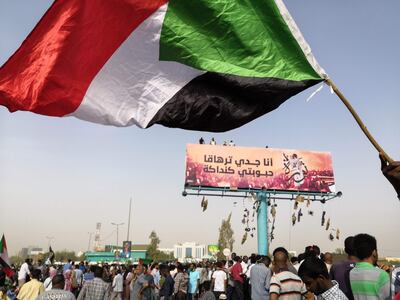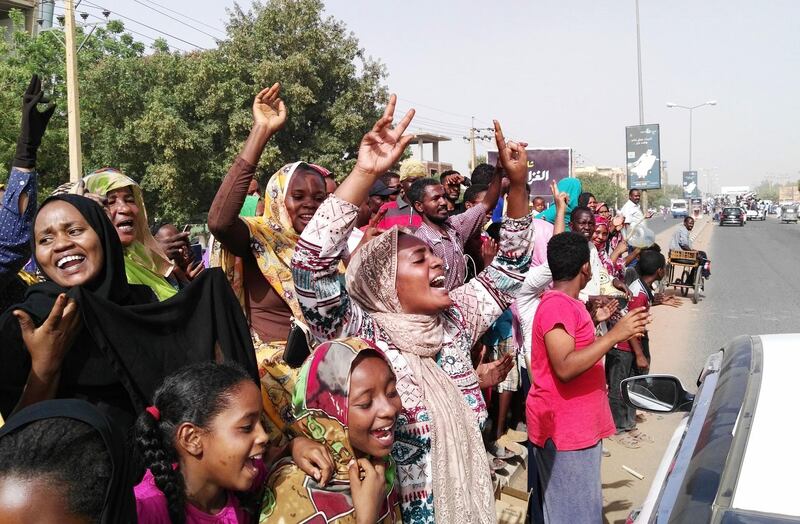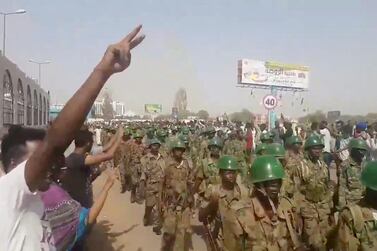Tens of thousands of people in the Sudanese capital of Khartoum headed to a mass sit-in outside the military headquarters chanting “the regime has fallen” as the army ended President Omar Al Bashir’s three-decade rule.
In the early hours of Thursday morning, the military raided the state television and radio headquarters, as well as offices linked to Mr Al Bashir’s ruling National Congress Party, while military command said that an “important announcement” was imminent. Soldiers took up positions at strategic locations across the capital and all signs pointed to a coup in progress.
Sudan Live updates: army poised to take power in Sudan after mass protests against President Omar Al Bashir
State media played patriotic music on repeat throughout Thursday morning.
Several hours later, the announcement came, the military was taking over.
Sudan's defence minister Awad Mohamed Ahmed Ibn Auf announced that the president was under house arrest and the country was entering a two-year transition phase.
For the last week, thousands have gathered outside the military headquarters in the city centre, which also houses Mr Al Bashir's official residence and the defence ministry, marking a surge in the scale of demonstrations that have been rocking the country since mid-December.
Ahead of the military's announcement, Nuha Ali, who has taken part in the protests, described the scenes in Khartoum.
"Everyone is heading towards the building of the general command," where five days of sit-ins have taken place so far, Ms Ali told The National.
Having been part of the protests for weeks, Ms Ali said she was overwhelmed with joy and that everyone she met on the roads was jubilant.
"I'm so happy for this achievement. The blood we witnessed wasn't for nothing."
There has been a festive mood at the sit-in, with protesters singing and dancing to revolutionary songs.
"I hope our revolution will achieve its goal," said Alaa Salah, dubbed the protest movement's "Nubian queen", after a video clip went viral of her leading demonstrators in chants outside army headquarters.
But when the military announced the changes, the protesters' happiness soured.
Raphael, who was at the sit-in, told The National that "Ibn Auf said that he will be in power for two years until elections take place. This is not a revolution, this a palace coup. Nobody is happy and neither am I."
In a worrying development for those pledging to keep the sit-in going, the defence minister also announced a curfew.
"Nobody will leave this sit-in until Ibn Auf is gone. People view him as part of Bashir's regime. Bashir made him the vice president and he is part of the previous regime... I don't know what will happen in the next hours, but at least Bashir is gone and hopefully along will all the corruption."
Security forces allied to the president had clashed with the demonstrators and the military on Tuesday. But activists said that Wednesday night had been peaceful – with many on social media sharing images of large crowds watching Barcelona beat Manchester United 1-0 in the Champions League.
"The revolution can wait, Barcelona and Man United are playing."
— Yousra Elbagir (@YousraElbagir) April 10, 2019
Protesters at Sudan's mass anti-regime sit-in, watch the footie on screens they set up today. pic.twitter.com/W2zJRGzb8Y
Protest organisers say at least 21 have been killed, including six members of the security forces, since the sit-in began on Saturday.
Those on the streets have braved repeated volleys of tear gas from members of the powerful National Intelligence and Security Service (NISS) since they began camping outside the complex, protest organisers say. Those taking part told The National that the security forces had also fired live ammunition at protesters until the army intervened and pushed them back.
The groups spearheading the nationwide demonstrations urged residents of the capital to join the sit-in and refuse to leave after the military’s announcement. Thousands heeded the call.
"We have to continue to gather at the sit-in area until the conditions of our revolution as agreed by our alliance have been met," the Alliance for Freedom and Change said.
The protests, which erupted in December over the government's tripling of the price of bread, became the biggest challenge to Mr Al Bashir in his three decades of iron-fisted rule.
"We had enough of this regime 30 years of repression, corruption, rights abuses, it's enough," one protester at the sit-in said.
The NCP said plans to hold a rally backing the president on Thursday had been postponed.
The United States and the European Union called for an emergency meeting of the United Nations Security Council to discuss the developments in Sudan and the international community began to react to the changes.
The council is expected to discuss the situation in Sudan during a closed-door meeting on Friday that was also requested by France, Britain, Germany, Belgium and Poland.
Egypt said it backed the removal of Mr Al Bashir, saying it supports the "Sudanese people's choice and will".
The statement called on the international community to help Sudan to have a peaceful transition.
Turkish President Recep Tayyip Erdogan said he hoped Sudan could overcome its upheaval peacefully through "national conciliation" and urged it to try to operate "a normal democratic process".
UK Foreign Secretary Jeremy Hunt said that “Sudan’s brave people have called for change, but it must be real change. A military council ruling for 2 years is not the answer.”
#Sudan’s brave people have called for change, but it must be real change. A military council ruling for 2 years is not the answer. We need to see a swift move to an inclusive, representative, civilian leadership. And we need to ensure there’s no more violence.
— Jeremy Hunt (@Jeremy_Hunt) April 11, 2019
📸: @lana_hago pic.twitter.com/UoIdFbTfOb
Mr Al Bashir, a former paratrooper who seized power in a bloodless coup in 1989, has been a divisive figure whose presidency has lurched from one crisis to another.
First, the second Sudan civil war between the government in the north and the Sudanese Liberation Army in the south divided the country.
His campaign to crush a rebellion in the western Darfur region earned him an indictment for genocide from the International Criminal Court in 2010.
Actor and activist George Clooney, who has been arrested protesting against the Sudanese government’s military campaign in Darfur, also said the departure of Mr Al Bashir was not enough.

"The people of Sudan have been waiting for this day for a long time, but it is only a tentative first step towards real change," Clooney said in a joint statement with John Prendergast, the human rights campaigner with whom the actor founded The Sentry Project, which researches illicit money and war crimes in Africa.
"Removing the leader of a violent, corrupt system without dismantling that system is inadequate," they said.
In 2011, the south of the country seceded, taking most of the country's oil wealth and triggering one of the worst economic crises to hit Sudan since independence in 1956.
The mass sit-in coincided with the 34th anniversary of the 1985 coup that overthrew the brutal regime of former president Jaafar Nimeri.
That led to an elected government, which ruled for four years before Mr Al Bashir seized power in a coup of his own.
Sadiq Al Mahdi, who led the country following the 1985 coup before being deposed by Mr Al Bashir, has joined the protesters. This week he called for "a select military command" to negotiate a transition towards democracy.
Although Mr Al Bashir resigned as chairman of the National Congress Party in March and announced a cabinet reshuffle, the move did little to stem the demonstrations.
His new administration saw a greater role for the military with officers appointed to governorships and cabinet posts in a move experts believed was an attempt to bolster support among the army leadership and head off a coup.
That plan ended abruptly on Thursday and what comes next remains to be seen.






